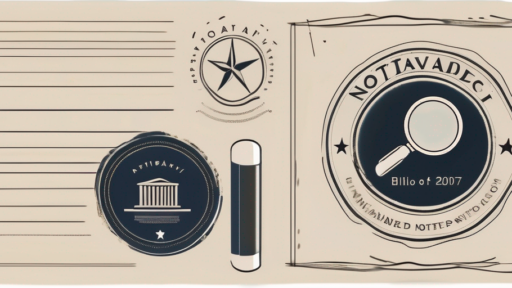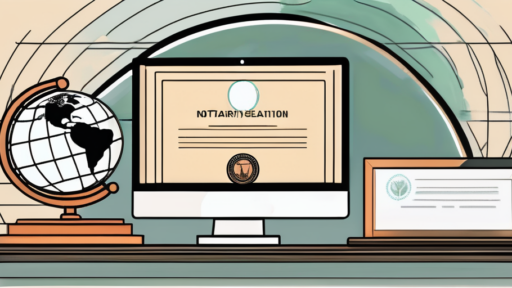Need to get a document notarized? Your bank might be the easiest option.
Many banks offer free notary services to their customers. You walk in, show your ID, sign your document in front of the notary, and you’re done. No appointment needed, no fees charged.
But not every bank does this, and not every branch has a notary on staff. Here’s what you need to know about getting documents notarized at your bank.
If you’re looking for the fastest solution, you can get your document notarized online in less than 10 minutes without leaving your couch.
What Does a Notary Public Do?
A notary public is someone authorized by the state to witness document signings and verify identities.
Here’s what happens during notarization:
Identity Verification – The notary checks your government-issued ID to confirm you are who you claim to be
Willingness Check – They make sure you’re signing voluntarily, not under pressure or coercion
Awareness Confirmation – They verify you understand what you’re signing
Signature Witnessing – They watch you sign the document
Seal and Signature – They add their official stamp and signature to make it legally binding
Record Keeping – They log the notarization in their official record book
This process prevents fraud. If someone later claims a signature is fake or that they were forced to sign, the notary’s record proves otherwise.
Why Documents Need Notarization
Notarization adds legal weight to important documents.
Documents That Commonly Require Notarization
Power of Attorney – Gives someone else legal authority to act on your behalf for financial or medical decisions
Wills and Trusts – Estate planning documents outlining what happens to your assets after you die
Property Deeds – Transfers ownership of real estate from one person to another
Mortgage and Loan Documents – Confirms your identity when borrowing money, especially for large loans
Affidavits – Sworn written statements used as evidence in legal proceedings
Title Transfers – For vehicles, boats, or other titled property
Adoption Papers – Legal documents finalizing adoptions
Custody Agreements – Court documents regarding child custody arrangements
What Notarization Actually Does
When a document is notarized, it:
Prevents Fraud – Identity verification makes impersonation much harder
Provides Legal Protection – Courts readily accept notarized documents as evidence
Confirms Understanding – Proves all parties knew what they were signing
Creates an Official Record – The notary’s log book serves as proof if questions arise later
Speeds Up Legal Processes – Notarized documents move through courts and government offices faster
Without notarization, many documents won’t be accepted by courts, government agencies, or financial institutions.
Which Banks Offer Notary Services?
Many major banks provide notary services, typically free for account holders.
Banks Known for Offering Notary Services
Chase Bank – Free for customers. Not available to non-customers at most branches.
Bank of America – Free for customers. Non-customers pay $2-$10 per signature at some branches.
Wells Fargo – Free for customers. Generally not available to non-customers.
PNC Bank – Free for customers. Non-customer availability varies by branch.
TD Bank – Free for customers at participating branches.
U.S. Bank – Free for customers. Check your local branch for availability.
Regions Bank – Free for customers in most markets.
Fifth Third Bank – Offers notary services to account holders.
Important Caveats
Not Every Branch Has a Notary – Even if the bank offers the service, your specific branch might not have a notary on staff that day.
Hours Matter – The notary might work limited hours or take lunch breaks. Showing up at noon could mean waiting or coming back later.
Appointment Policies Vary – Some branches require appointments, others take walk-ins. Call ahead.
Non-Customer Policies Differ – Most banks prioritize their own customers. If you don’t have an account there, they might not help you at all.
How to Get Documents Notarized at Your Bank
Step 1: Call Ahead
Don’t just show up. Call your branch and ask:
- Do you have a notary on staff?
- What are their hours?
- Do I need an appointment?
- What do I need to bring?
- Is there a fee for this service?
This five-minute phone call prevents wasted trips.
Step 2: Gather What You Need
Valid Photo ID – Driver’s license, passport, state ID, or military ID. Must be current (not expired more than a few years).
The Unsigned Document – Bring it complete but unsigned. The notary must watch you sign.
Any Additional Paperwork – Some documents require supporting materials. Check beforehand.
Step 3: Visit During Notary Hours
Show up when the notary is actually there. Banks typically have notaries during regular business hours, but not always.
The notary might be busy with other customers. Be prepared to wait 10-15 minutes if the branch is crowded.
Step 4: Complete the Notarization
The process takes about 5 minutes:
- Notary checks your ID
- Notary asks if you understand the document
- You sign in their presence
- Notary adds their seal and signature
- Notary records it in their log book
That’s it. You walk out with a notarized document.
Cost of Bank Notary Services
For Bank Customers
Most banks offer free notary services to account holders. This is one of the perks of having an account there.
If you bank at Chase, Wells Fargo, or Bank of America, you can typically get unlimited notarizations at no charge.
For Non-Customers
Banks are less generous with non-customers:
- Many won’t serve non-customers at all – They reserve the service for their own account holders
- Some charge $2-$10 per signature – Bank of America and a few others will notarize for non-customers at a fee
- Availability is limited – Even if they technically offer it, they might prioritize customers and make non-customers wait
If you don’t have an account, you’re better off finding another option.
When Bank Notaries Don’t Work
Banks are convenient, but they’re not always the answer.
You’re Not a Customer – If you don’t have an account there, most banks won’t help you.
Outside Business Hours – Banks close at 5 or 6 PM on weekdays and may not be open weekends. If you need notarization at 7 PM on a Saturday, the bank won’t work.
No Notary Available – The one employee with a notary commission called in sick, is on vacation, or quit last month.
Complex Documents – Some bank notaries only handle simple documents. They might refuse unusual or complicated paperwork they’re not comfortable with.
Multiple Parties Need to Sign – If three people need to sign and they can’t all make it to the bank together during business hours, you need a different solution.
Alternatives to Bank Notaries
UPS Store and Shipping Centers
UPS Stores often have notaries on staff:
- Extended hours including evenings and some weekends
- No account or membership required
- Costs $10-15 per signature
- Available to walk-ins
FedEx Office locations sometimes offer notary services too, though less commonly than UPS.
Mobile Notary Services
Mobile notaries drive to you:
- They come to your home, office, hospital, or anywhere convenient
- Available evenings and weekends
- Handle complex documents and multiple-party signings
- Cost $75-150 including travel fee
Good for: People who can’t easily get to a bank, multiple signers in one location, or after-hours needs.
Online Notary Services
Remote online notarization (RON) lets you get documents notarized via video call:
BlueNotary offers convenient online notarization:
- Complete the process in 10-15 minutes from anywhere
- Available 24/7 including nights, weekends, and holidays
- No travel required
- Legal in most states
- Cost $25 per document
Online notarization works great for:
- People working from home
- Urgent documents needed outside business hours
- Anyone who doesn’t want to leave the house
- Remote workers or people traveling
Law Offices
Many law firms have notaries on staff. If you’re already working with an attorney, ask if they can notarize your documents. They might do it for free if you’re a client.
AAA Offices
If you’re an AAA member, many of their offices offer free notary services to members. This is an underrated perk of membership.
Libraries and Government Buildings
Some public libraries and city halls offer free or low-cost notary services to residents during limited hours. Call to check availability.
What to Know Before You Go
Bring the Right ID
Your ID must:
- Be government-issued with your photo
- Show your current legal name
- Be unexpired (or expired recently—some states allow expired IDs)
- Match the name on the document you’re signing
If your ID says “Robert” but the document says “Bob,” that might cause issues.
Don’t Sign Early
Sign the document in front of the notary, not before you arrive. Pre-signed documents can’t be notarized. If you already signed it, you might need a fresh copy.
Understand What You’re Signing
The notary will ask if you understand the document. If you say “no” or seem confused, they can’t proceed. Read it beforehand.
All Signers Must Be Present
If multiple people need to sign, everyone must appear in front of the notary together. The notary can’t notarize signatures from people who aren’t there.
Some Documents Have Special Requirements
Certain documents need witnesses in addition to the notary, or multiple notarizations, or specific wording. Know what your document requires before showing up.
Finding a Notary at the Bank Bottom Line
Yes, you can usually get documents notarized at your bank—if you’re a customer and if your branch has a notary available. It’s free, convenient, and takes just a few minutes.
Call ahead to confirm availability and hours. Bring valid ID and your unsigned document. The notary will watch you sign, add their seal, and you’re done.
If your bank doesn’t offer notary services, or if you need notarization outside banking hours, alternatives exist. UPS Stores, mobile notaries, and online notary services like BlueNotary all work well depending on your specific situation.
The key is planning ahead. Last-minute scrambling to find a notary creates stress. Knowing your options beforehand means you can get your documents notarized quickly and easily whenever you need to.
Frequently Asked Questions
Do all bank branches offer notary services?
No. Even if your bank offers notary services, not every branch has a notary on staff. Call your specific branch to confirm before visiting.
Are notary services free at banks?
Most banks offer free notary services to account holders. Non-customers usually can’t access the service at all, though some banks charge non-customers $2-10 per signature.
What documents do I need for notarization?
You need valid government-issued photo ID (driver’s license, passport, state ID, or military ID) and the complete, unsigned document you want notarized. Requirements may vary by document type.
Can I use mobile or online notary services if my bank doesn’t offer them?
Yes. Mobile notaries travel to your location ($75-150 typically), while online notaries complete the process via video call ($25-40). Both are good alternatives when bank notaries aren’t available.
Which documents commonly require notarization?
Power of attorney, wills, trusts, property deeds, mortgage documents, affidavits, title transfers, adoption papers, and custody agreements commonly require notarization.
What is the role of a Notary Public?
A notary public witnesses document signings, verifies signer identities with photo ID, confirms people understand what they’re signing and are signing willingly, and maintains official records of all notarizations to prevent fraud.
Why might I need a notary?
Notarization makes documents legally binding and widely accepted by courts and government agencies. It prevents fraud, confirms all parties understood the agreement, and creates an official record if disputes arise later.
How do I find out if my bank offers notary services?
Call your local branch directly or check the bank’s website. Ask about notary availability, hours, appointment requirements, and any fees for non-customers.
Are there specific banks known for offering notary services?
Chase Bank, Bank of America, Wells Fargo, PNC Bank, TD Bank, U.S. Bank, Regions Bank, and Fifth Third Bank all commonly offer notary services free to account holders.
What are the costs associated with using mobile or online notaries?
Mobile notaries typically charge $75-150 including travel fees. Online notaries like BlueNotary charge $25 per notarization. Pricing varies by location, urgency, and document complexity.








